*Note: Self-acceptance is one of my favourite subjects to discuss and talk about, so when Kelsey offered to write a guest post about this topic, I was excited. As the tagline of this blog states, ‘articulating lifelong illnesses from various perspectives’, I am always eager to hear your point of view. There are thousands of chronic illness and symptoms out there, and everyone struggles and copes with them in their own ways.
Acceptance of chronic pain and a seemingly ‘lesser’ life can be a bitter pill to swallow. I get it. When I was 14 I swore (and back in those days my parents said I should never swear because it’s un-Christian to do so), but I swore to fight it to death. 20 years later, I have changed my stance a little.
For me, I had to hit a wall that I could no longer bash through on my own before I sought professional help. The psychologist I selected played a huge role in my mental recovery. It’s still an ongoing process – healing and acceptance – and I’m definitely not going to insist that self-acceptance is the one and only way to cope with chronic illness and pain. But I also think there’s no harm listening to a different point of view, and giving it some consideration. We can look at perspectives as tools, and keep them in the same toolbox. Different tools can come in handy for different days, different pains, and different circumstances. Context is important. Without further ado, I’ll let Kelsey share her point of view on self-acceptance, and why it’s important when you have chronic illness:
Pin to Your Self-Acceptance & Chronic Illness Boards:
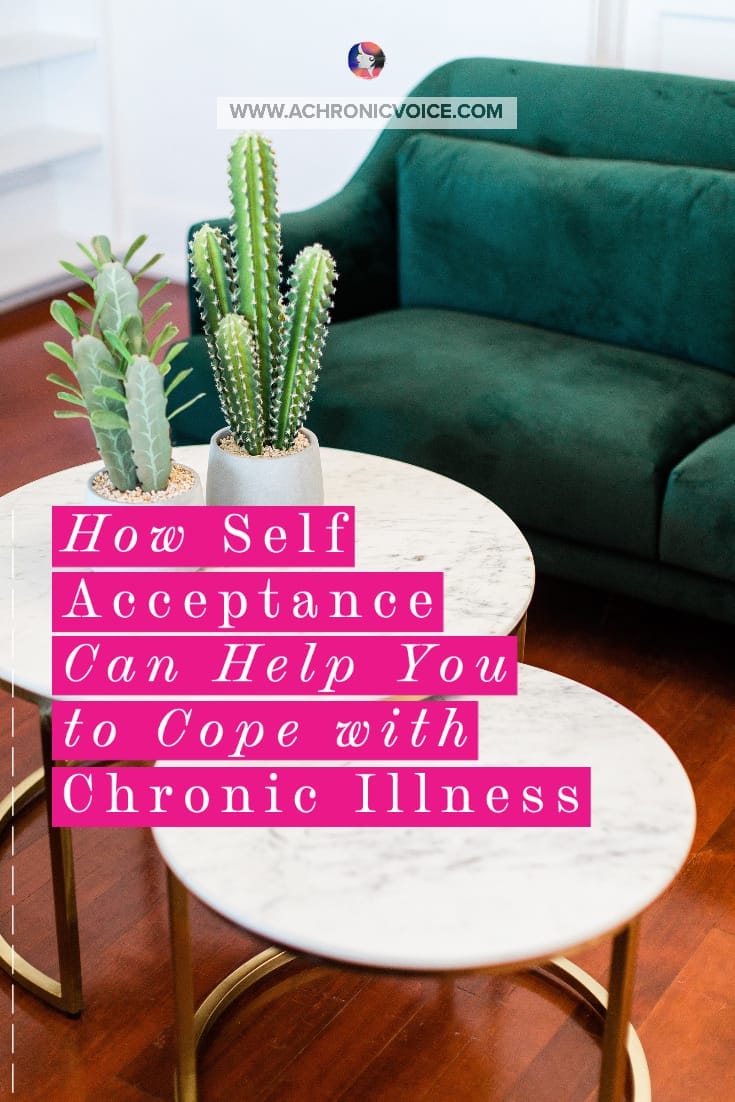
Let’s face it, most of us struggle with self-acceptance even without chronic illness. Negative self-talk is so easy to engage in, and pretty much every human being does it. When you have a chronic illness, it can be even easier to be extra hard on yourself, or blame yourself for what you’re going through and how it’s affecting others.
The Struggle with Self Acceptance Over the Years
I’ve been there. I’ve struggled with self-acceptance at several points in my life, and most recently for the first two years after I was diagnosed with fibromyalgia. I spent a lot of time over the past few years thinking about self-acceptance, self-compassion, and self-love, all of which have become priorities to me. Does that mean I never engage in negative self-talk? No, it means that I am aware when I do and try to reframe it in my mind. Learning to accept yourself as well as your illness is incredibly important in your over all wellbeing, both body and mind.
The Importance of Self Love and Self Compassion
To even have self-acceptance, I’ve found that it’s important to start with two other concepts. First, self-love, because if you don’t love who you are and forgive yourself for any mistakes, how can you expect anyone else to do so? And yes, loving yourself means you with your illness, not you before your illness (though you can love her too).
Second, self-compassion is a necessary ingredient in the self-acceptance recipe. Your illness may mean you need to make a lot of changes to your lifestyle or in your life and relationships in general. Being compassionate with yourself will make this process easier. With these two components you can begin to accept yourself, your life, and your illness as your reality has changed.
It can be a process and a lot of work, but it’s worth it. Whether it’s something you can do on your own, through reading self-help books and blogs, or you need a therapist to help you with, if you aren’t engaging in self-acceptance it might be time to reflect and see if you can.
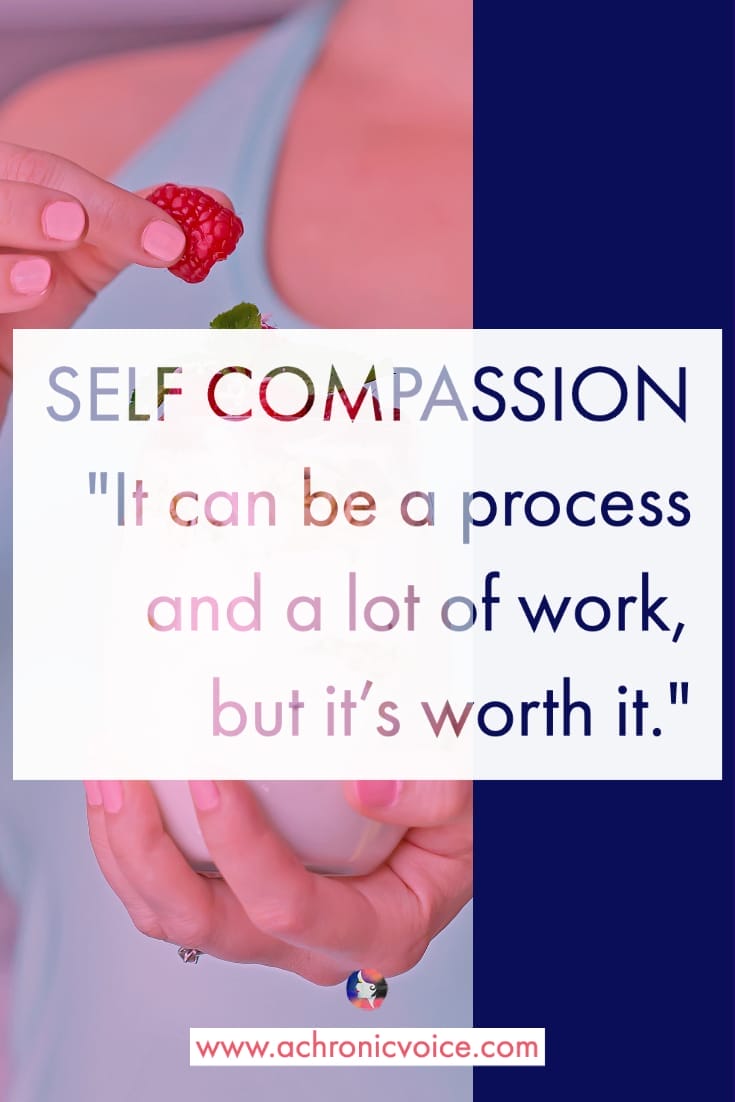
Self Acceptance and Its Role in Mental Health
Self-acceptance leads to better mental health. Sometimes when we struggle with our physical health we forget about our mental health, and yet the two are closely connected. As I have been studying psychology for the past year, I see more and more how the two are related.
For many illnesses, stress can set off flares, just like having an illness can itself cause anxiety and depression. Letting go of expectations, mistakes, and how your condition has “changed you” is a start in accepting yourself and will help your mental health. Journaling, especially in gratitude journals, is a way to put this into practice, and you might be amazed at how easily you start to feel happier.
Self Acceptance Can Help Us to Communicate Our Needs Better
Self-acceptance makes it easier to communicate your needs to others. If you have a chronic illness, you no doubt have a lot more needs than you did before you were sick. There are many times when you may have to let your family, partners, friends, employers, and doctors know what your needs are. The more comfortable and better you feel about yourself and your illness, the more easily you will be able to share with people who can help you.
Self-acceptance helps set boundaries. How can you set up boundaries with anyone if you don’t care enough about yourself to accept your current reality? I don’t think you can, at least not properly. I’ve found that my boundaries around dating, friendships, sharing my story and my needs, and trying new things have been easier to set the more accepting I am of myself and my capabilities. You have to advocate for yourself because no one else truly can.
Self-acceptance will allow you to continue to fully live your life. That’s really what it comes down to, isn’t it? I want to lead the best life I can, chronic illness or not. I also know that I can, but it took the work of truly accepting who I am to start living it as full, or arguably even more fully than, I was before I was diagnosed with fibromyalgia. The only thing that can stop me is myself, and the only thing that can stop you is yourself. If you’re not practicing self-acceptance regularly, now is the time.
*Note: This article is meant for educational purposes and is based on the author’s personal experiences. It is not to be substituted for medical advice. Please consult your own doctor before changing or adding any new treatment protocols.
If you liked this article, sign up for our mailing list here so you don’t miss out on our latest posts! You will also receive an e-book full of uplifting messages, quotes and illustrations, as a token of appreciation!
Pin to Your Self-Acceptance & Chronic Illness Boards:
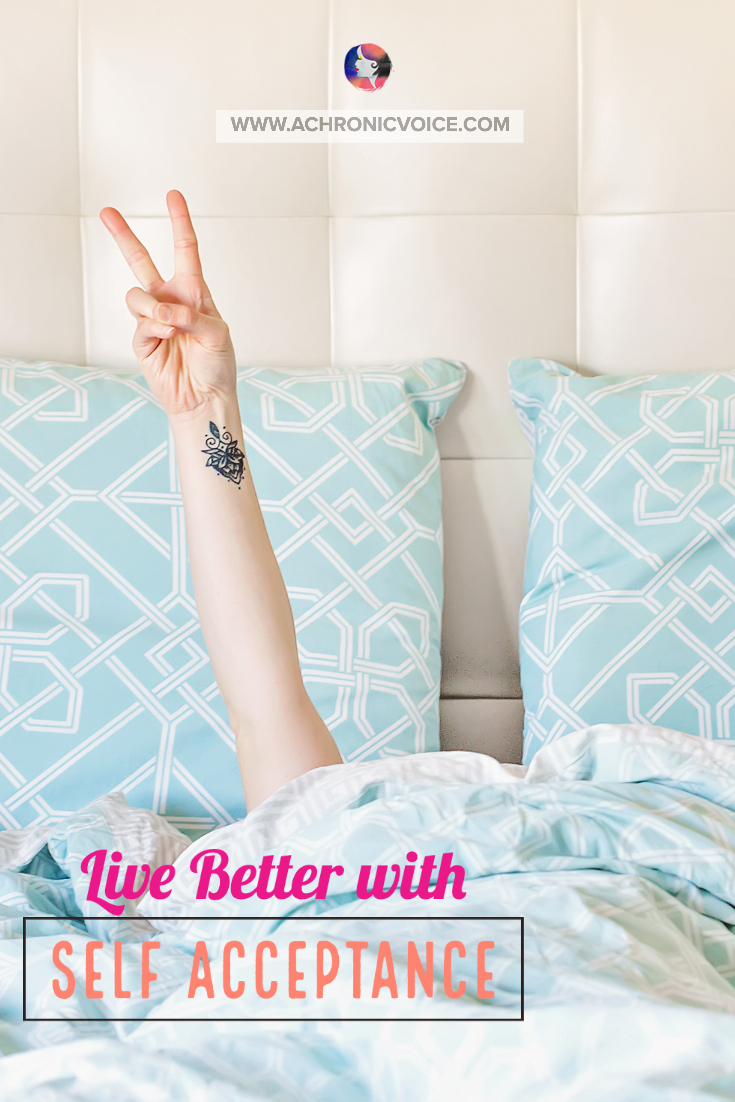
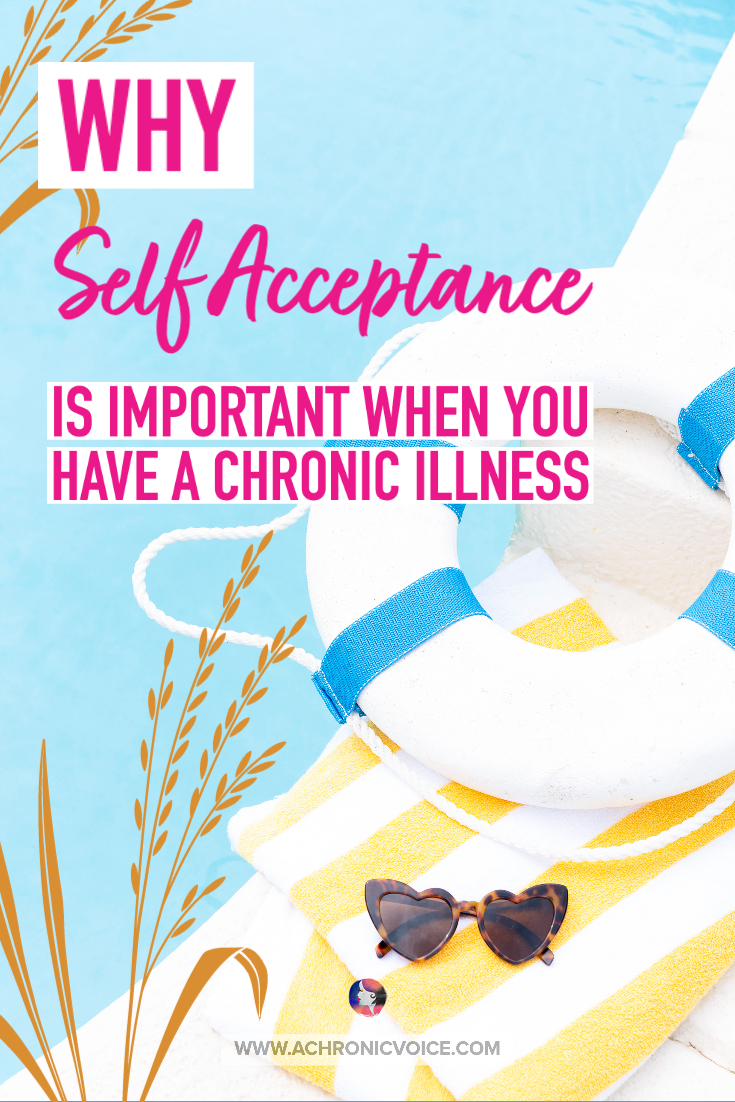
Contributor Bio
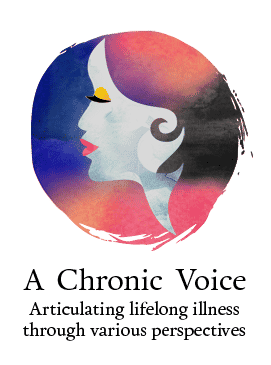
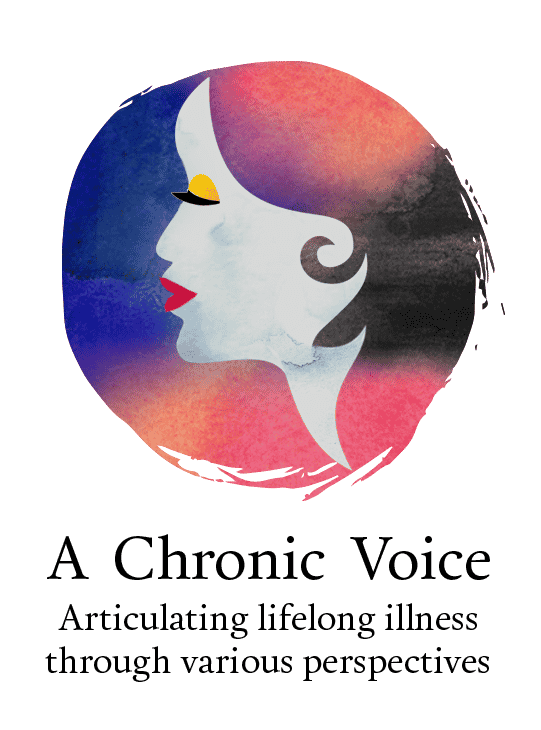
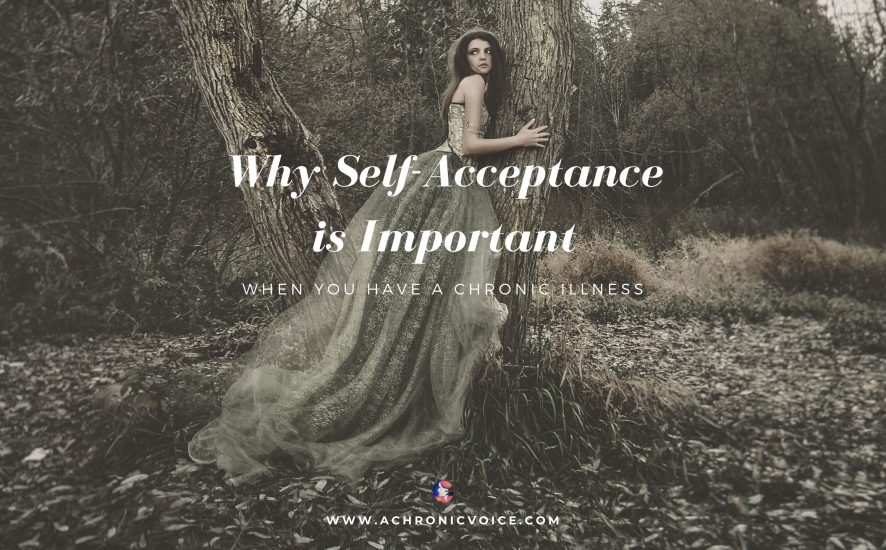
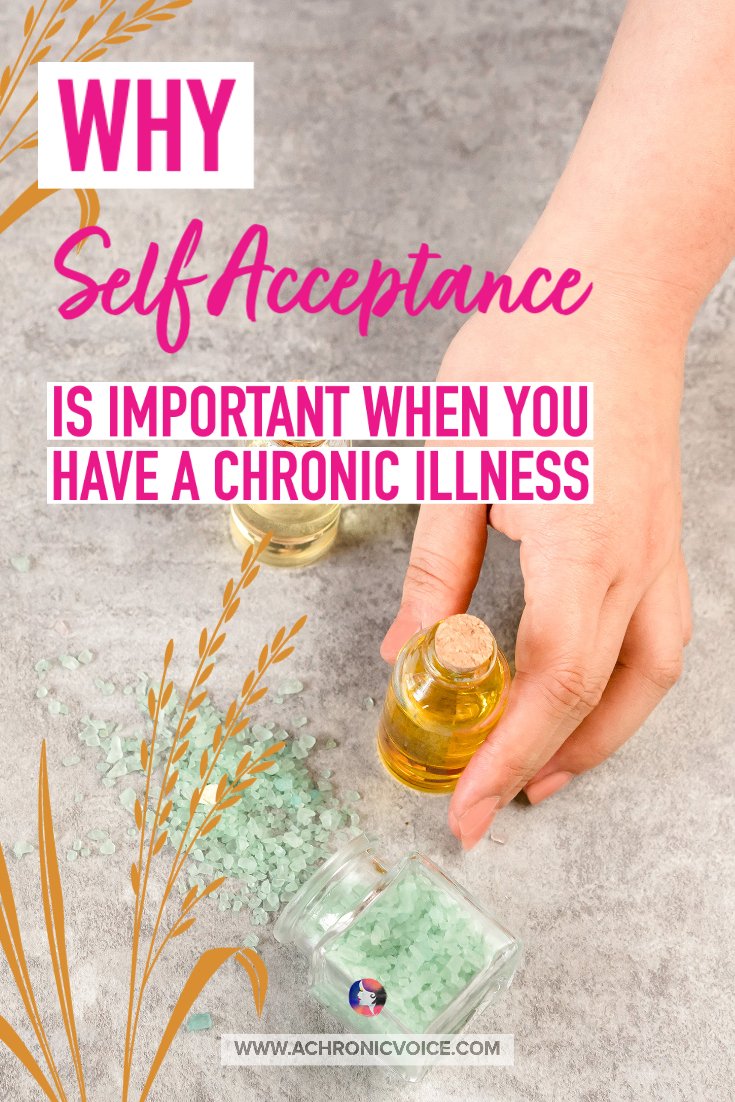
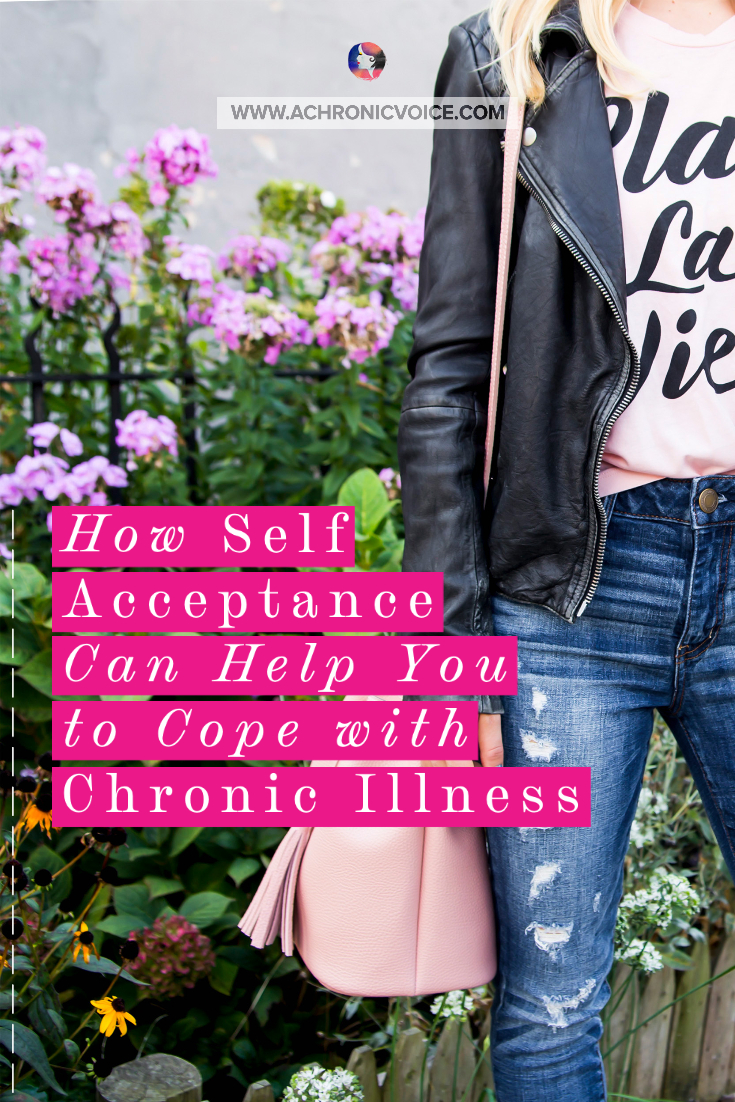

Thanks for sharing your story. I too had a difficult time accepting my new self after fibromyalgia diagnosis. I had to accept my new reality of it and learn to live with it. Self acceptance made my life better.
Hi Raina, yes Kelsey was brave to share 🙂 It’s really difficult to accept it I agree. It can take a long time, and did so for me. It’s an ongoing process too. Sending love x
Thank you for sharing this! Self-compassion in particular is something I’m working on as someone with various mental health conditions, esp. during lockdown at the moment. Be safe xx
You’re welcome Yaya, Kelsey did a great job of highlighting this important facet of life with chronic illness and pain, I think 🙂
Coming to terms with my chronic illness and finding acceptance was a huge step toward happiness for me. I suffered terribly from negative self-talk and deeply toxic shame. It’s definitely a journey rather than a destination, but taking those first steps are definitely steps in the direction of a more fulfilling and satisfying life. Great guest post!
Hi Michelle, I’m glad you have found a more fulfilling and satisfying path for yourself 🙂 Yes self-acceptance is tough, but there is so much freedom in it, too 🙂 Sending happiness your way! x
I think Kelsey has made some spot-on points, and acceptance of illness and the ‘lesser’ life has been one of the hardest aspects for me to deal with. I see it as a continual work-in-progress. Self-acceptance is more inclusive because you’re dealing with the illness(es), the new norm of your life, and yourself as a whole, and it can be a difficult one to get your head around let alone really come to terms with and put into practice. But without that self-acceptance, at least a good degree of it, you’ll be forever hitting a wall and building up bitter feelings that make any life, including a chronic illness life, an uphill battle.
Caz xx
Love the way you summed this up, Caz! Because that was exactly it – I kept butting my head against a wall and was getting myself more and more injured by fighting and fighting. It definitely is a continual work in progress, especially when you receive a new bad diagnosis, go into a painful flare, etc. And I love that you use the word ‘inclusive’ to talk about a person as a whole – because that’s so true. Thanks for sharing this comment!!
I nodded vigorously while reading this article! Having battled with a rare eye disorder all my life, I thought I had found a way to live with it not impacting on my lifestyle. However I realise that is simply not true, and now I’m in the process of learning to speak out and educate my family and friends. They may think I am fine and healthy when in truth I am struggling. Rather than battle on alone, I am putting support networks in place.
I’m happy that you’re putting support networks in place for yourself, Catherine! There really is NO shame in that. It not only improves your own quality of life, but allows your loved ones into your space for greater bonding, and so that they can enjoy life together more with you 🙂 Sending love! x
Thank Kelsey, self-acceptance is a major challenge with chronic illness and I had to do it the hard way by also accepting me as a person with a chronic illness, it made me take the longest and hardest look I have ever done at myself and at times I struggle but mostly I am not only accepting me for what I a I also advocate for me and others.
I do think many of us with chronic illness start out battling against it. Some of us never stop. If that helps them cope – it’s fine. But I do personally believe it really isn’t a long-term strategy to keep fighting. That’s just plain exhausting, when that energy could be spent on other things that would better improve our quality of life. Thank you for advocating for others, and yes, self advocacy is so important, too!!
Kelsey, I really enjoyed this. If I could get one lesson through to a friend with a new diagnosis, it would be about working with self acceptance. It’s cyclical. Understanding it is crucial to living well.
Agreed! It’s so hard to do so though, especially if you’re newly diagnosed. Fighting for decades gets tiring though. Working with my body has been a better long-term strategy, if you could call it that!
Self-acceptance is SO hard but SO necessary! Thanks for this post.
Kelsey did a great job sharing using her own experiences 🙂 I agree – it’s such a necessary ingredient in life to thrive.